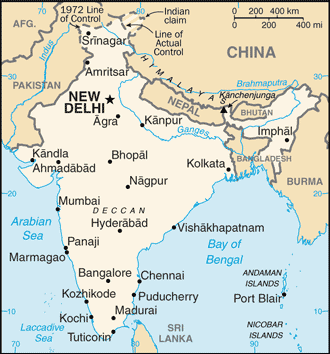
Importing from India
India Import Guide | Trade Finance Global
Importing from India
India is one of the fastest growing economies in the world with growth rates reaching 9% in recent years. India is being targeted by investors for major growth in a number of areas including life sciences, infrastructure, energy and manufacturing. It is predicted to be the world’s third largest economy and largest middle class consumer market by 2030. Exports from India have grown at a rapid rate, climbing from $179 billion in 2010 to $310 billion a year. Over the same period the export to GDP ratio increased from 13.3% to 15.6%, demonstrating the importance of exports to the growing economy. The foreign trade policy of the national government is looking to build on this success, aiming to increase exports to $900 billion by 2020.
India Country Profile
| Official Name (Local Language) | Bharatiya Ganarajya | Capital | New Delhi | Population | 1,266,883,598 | Currency | Indian Rupee | GDP | $2,251 billion | Languages | English, Hindi | Telephone Dial In | 91 |
India Exports Profile
Exports ($m USD)
294,364
Number of Export Products
4,418
Number of Export Partners
219
Top 5 export partners
Country
Trade
% Partner Share
United States
46,018
15.63
United Arab Emirates
28,636
9.73
Hong Kong, China
15,021
5.10
China
12,495
4.24
Singapore
11,560
3.93
Top 5 Export Products at HS 6 digit level
Export Product
Number
Petroleum oils, etc, (excl. crude); preparation
11.8%
Diamonds non-industrial nes excluding mounted o
8.4%
Other medicaments of mixed or unmixed products,
4.3%
Art. of jewellery and pts thereof of/o prec mtl
3.9%
Semi-milled or wholly milled rice
2.4%
Chart Showing GDP Growth Compared to rest of world
GDP Composition for India
Agriculture
%
Product List
16.5%
Rice, wheat, oilseed, cotton, jute, tea, sugarcane, lentils, onions, potatoes; dairy products, sheep, goats, poultry; fish
Industry
%
Industry List
29.8%
Textiles, chemicals, food processing, steel, transportation equipment, cement, mining, petroleum, machinery, software, pharmaceuticals
Services
%
Services List
45.4%
Importing from India: What is trade finance?
Stock finance is a revolving facility which alternative lenders offer – it enables organisations to buy stock and can help ease the pressure from cash management. Typically, an alternative financier will fund most of the cost of the stock, including charges (e.g. insurance costs). Trade finance offers advantages over more traditional bank funding for example invoice finance or business loans. Trade finance provides quick funding without affecting existing relationships with banks.
How does it work?
If you’re a company importing or exporting inventory outside of your own country, then a trade finance facility would allow you to fund this through offering a LC (letter of credit) or some form of cash advance.
I’m looking to import from India, how can Trade Finance Global help, and how does it work?
If you’re looking to import from India, contact our local experts in trade finance to see how we can help you grow your business in other markets. If you are looking to import stock from other countries, you may need import finance, which is an agreement between yourself (the importer) and the foreign exporter. A non-bank lender will act as the intermediary, paying the foreign exporter on your behalf until you receive the goods and have then sold them to your customer. Repaying the financier then occurs over an agreed period. Read the TFG Importers Guide here.
Information

Importing from India? Contact our local experts

India Economic Statistics
Government Website
https://www.india.gov.in/
Sovereign Ratings
https://countryeconomy. com/ratings/india
Central Bank
Reserve Bank of India
Currency USD Exchange Rate
68.3
Unemployment Rate
2.7%
Population below poverty line
NA
Inflation Rate
1.9%
Prime Lending Rate
5.4%
GDP
$2,251 billion
GDP Pro Capita (PPP)
$6,700
Currency Name
Indian Rupee
Currency Code
INR
World Bank Classification
Lower Middle Income
Competitive Industrial Performance
39/138
Corruption Perceptions Index
81/180
Ease of Doing Business
77/190
Enabling Trade Index
102/136
Currency in India
About the Author
Natasha Roston is Head of People and Growth at Trade Finance Global (TFG).
She builds partnerships to create innovative trade finance education projects and experiences. A key advocate for TFG’s annual Women In Trade campaigns, Natasha wrote a piece on the impact of gender stereotypes for gender equality in the workplace in 2022. Natasha is also responsible for TFG careers, culture, and team growth. A Level 2 Qualified Coach and Mental Health First Aid Champion, she leads internal training, supporting the holistic wellbeing of the team.
Before joining TFG Natasha worked in education for over a decade. Initially as a classroom teacher, and then in academic and pastoral leadership roles. Following this, she worked in EdTech as a Learning Design Coach for Aula’s Higher Education platform.
Natasha holds an MA from Tel Aviv University, a History PGCE from The Institute of Education and a BA from the University of Nottingham. Currently, she is studying for her Level 3 Certificate in International Trade from the Institute of Export & International Trade. In addition to her work at TFG, Natasha volunteers for the Young Women’s Trust as a Work It Out – CV Volunteer.
Careers | Terms of Business | Get in Touch | Partners
Trade Finance Global is the trading name of TFG Finance Ltd (company number: 10305143) and TFG Publishing Ltd (12157036), incorporated in England and Wales, at 201 Haverstock Hill, Second Floor Fkgb, London, England, NW3 4QG. Trade Finance Global is registered as a Data Controller under the ICO: ZB421903 and ZB436621.
TFG Finance Ltd is an introducer, not a lender, working with Limited Companies and Incorporated Bodies who may pay us a commission.
© 2024 Trade Finance Global
 Australia
Australia Hong Kong
Hong Kong Japan
Japan Singapore
Singapore United Arab Emirates
United Arab Emirates United States
United States France
France Germany
Germany Ireland
Ireland Netherlands
Netherlands United Kingdom
United Kingdom
 British Pound Exchange Rate
British Pound Exchange Rate



